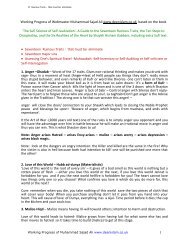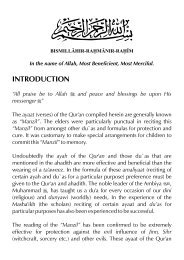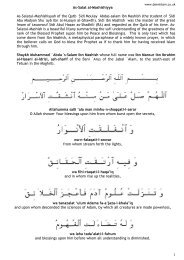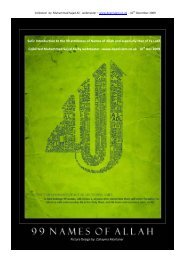Sufi Introduction to the 99 Names of Allah and sufi ... - Deen islam
Sufi Introduction to the 99 Names of Allah and sufi ... - Deen islam
Sufi Introduction to the 99 Names of Allah and sufi ... - Deen islam
Create successful ePaper yourself
Turn your PDF publications into a flip-book with our unique Google optimized e-Paper software.
Collected by Muhammad Sajad Ali - webmaster – www.deen<strong>islam</strong>.co.uk - 10 th December 2009<br />
And He counts <strong>the</strong> number <strong>of</strong> everything.<br />
<strong>and</strong> hold <strong>to</strong> that secret, <strong>and</strong> connect this uncertainty <strong>to</strong> <strong>the</strong> habitual human way <strong>of</strong> seeing things, according<br />
<strong>to</strong> <strong>the</strong> cus<strong>to</strong>mary mode ol expression among <strong>the</strong> Arabs for <strong>the</strong> general idea <strong>of</strong> "many." Uncertainty pertains <strong>to</strong><br />
<strong>the</strong> creature, despite his wanting <strong>to</strong> count exact numbers <strong>and</strong>, from ano<strong>the</strong>r perspective, his wanting <strong>to</strong><br />
declare himself as free <strong>of</strong> limitation as he has declared his Maker.<br />
So let <strong>the</strong> reader take this verse as intending <strong>the</strong> general idea <strong>of</strong> "many" <strong>and</strong> not as specifying a number.<br />
Although numbers are not absent from <strong>the</strong> verse, still <strong>the</strong> Speaker's intention here is not <strong>to</strong> signify some<br />
particular number; <strong>the</strong> intention is <strong>to</strong> signify multitude. This sort <strong>of</strong> phraseology was in use among those <strong>to</strong><br />
whom <strong>Allah</strong> sent His Message, <strong>and</strong> when <strong>the</strong>y employed it <strong>the</strong>y certainly did not intend that one should insist<br />
on some precise number.<br />
And when <strong>the</strong> servant has borne witness <strong>to</strong> <strong>the</strong> intention <strong>of</strong> multitude here, he will discover <strong>the</strong> precise<br />
enumeration <strong>of</strong> all that he has known from <strong>the</strong> moment he came in<strong>to</strong> existence until his present moment,<br />
<strong>and</strong> <strong>of</strong> what will come <strong>to</strong> be, without end!<br />
(Actually, some <strong>the</strong>ological scholars disagree with us about whe<strong>the</strong>r knowledge can attach <strong>to</strong> two or more<br />
[simultaneous] objects. Some <strong>of</strong> <strong>the</strong>m hold that this is impossible. Those who allow it include Imam Abû 'Amr<br />
al-Silâlafî [may <strong>Allah</strong> be pleased with him], who did not disagree with us on this question. As for <strong>the</strong><br />
statement <strong>of</strong> al-Isfara'ini [Abû Ishâq] that <strong>the</strong> heart can bear no more than one knowledge at a time, it may<br />
be that he was hinting at our position. Within <strong>the</strong> framework <strong>of</strong> that statement are knowledge, <strong>the</strong> principles<br />
<strong>of</strong> action that take shape from knowledge, <strong>and</strong> its mastery, as well as an intimation <strong>of</strong> [what we have said].<br />
As far as we are concerned, our discourse is only with <strong>the</strong> masters <strong>of</strong> realities <strong>and</strong> secrets among <strong>the</strong> people<br />
<strong>of</strong> <strong>Allah</strong> Most High. We have sought <strong>to</strong> make a connection <strong>to</strong> some <strong>of</strong> <strong>the</strong> sayings <strong>of</strong> formal scholars in order<br />
<strong>to</strong> set at ease hearts that are straying from this Way with regard <strong>to</strong> <strong>the</strong>se realities. So know that. <strong>Allah</strong><br />
speaks <strong>the</strong> truth <strong>and</strong> He it is that shows <strong>the</strong> way.)<br />
HINTS OF MAJESTY<br />
<strong>Allah</strong> Most High said (Baqarah 163; also Kahf 110, Anbiyaâ 108, Hajj 34, Hâ Mîm Sajdah 5):<br />
ilâhukum ilâhun wâhidun<br />
Your god is One God.<br />
This also contains its own counterbalancing opposite. It is a statement applying <strong>to</strong> everything deified <strong>and</strong><br />
worshipped.<br />
Hint. This is a secret <strong>of</strong> <strong>Allah</strong>'s Divinity. If it were not for what every worshipper finds in <strong>the</strong> object <strong>of</strong> his<br />
worship – that is, in his act <strong>of</strong> worshipping that object – he would not worship it. If [idol-worshippers] were <strong>to</strong><br />
draw strength from <strong>the</strong> unequivocalness <strong>of</strong> this statement, <strong>the</strong>y would say that when <strong>Allah</strong> <strong>the</strong> Misleader<br />
misleads, He leads astray <strong>the</strong> relations between Divinity <strong>and</strong> <strong>the</strong> one who has no god, while [<strong>the</strong> idolworshipper]<br />
is merely <strong>the</strong> servant <strong>of</strong> a particular object <strong>of</strong> worship, <strong>the</strong> secret <strong>of</strong> whose divinity itself<br />
belongs <strong>to</strong> <strong>Allah</strong> Most High. That is <strong>the</strong> soul <strong>of</strong> His saying (Baqarah 163):<br />
158







